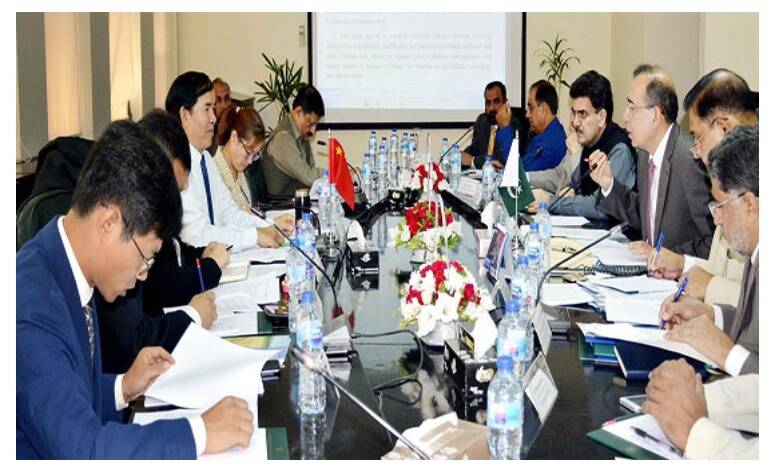China vows to provide date and potato processing and packaging technology to Pakistan
China acceded to transfer the date and potato processing and packaging technology to Pakistan. This decision was made during the recent China-Pakistan Joint Working Group (JWG) meeting between the Ministry of Agriculture and Rural Affairs of China and the Ministry of National Food Security and Research of Pakistan. Hashim Popalzai, Secretary National Food Security and Research, chaired the meeting in which Chinese and Pakistani agricultural experts and scientists also participated. Officials of both countries also agreed to collaborate for the protection and control of animal epidemics. The Agri cooperation is emphasised on boosting vertical increase in productivity of existing crops, transfer of knowledge and technologies, protection of germplasm resources to ensure food security of both countries. They also discussed livestock sector where Pakistani side invited the Chinese officials to contribute in the financing for the intelligent green-house farming, along with setting up foot and mouth disease (FMD) free zone to expand the halal meat exports in the country. Pakistan also proposed establishing the centre of excellence for livestock and fisheries research at Islamabad, and Multan in partnership with Chinese agricultural scientists.
ISLAMABAD: China on Friday agreed to transfer technology of date and potato processing and packaging to Pakistan in a major move to increase agriculture cooperation between the two countries.
China expressed the decision during the first meeting of China-Pakistan Joint Working Group (JWG) between the Ministry of Agriculture and Rural Affairs of China and the Ministry of National Food Security and Research of Pakistan. Secretary of National Food Security and Research Hashim Popalzai presided over the meeting, which was attended by Chinese and Pakistani agricultural researchers, scientists and senior officials.
An official told The News that Pakistani officials requested financial support from China for developing intelligent green house farming in the country and establishing foot and mouth disease (FMD) free zone to increase halal meat exports. The world halal food market has crossed $3 trillion.
While Chinese side agreed to deliberate upon the request, it promised to enhance agriculture cooperation through knowledge and technology transfer and various other interventions in already identified areas for increasing crops yield in Pakistan, the official said.
“Chinese side agreed to provide technical assistance to Pakistan on dates processing and packaging technology, potato processing, including potato flakes, flour, and starch and modified starch,” a statement said. “In the meeting it was also agreed, on the basis of cooperation in protection and control of animal epidemics, to enhance the regional management of animal epidemics and FMD free zone with the technical support of experts.” The secretary told the meeting that Pakistan made a visible progress towards entering next stage of FMD free zones and both the countries could work on it for mutual trade benefits.
Both the parties agreed that Pakistan-China agricultural cooperation would focus on the vertical increase in productivity of existing crops, transfer of knowledge and technologies, protection of germplasm resources in order to increase the production of agricultural products for food security and export to other countries.
Both the parties also agreed to promote and expand cooperation in the identified areas based on mutual understanding, focused on capacity building, germplasm resources, agricultural product processing, technology extension, fisheries, FMD construction and market information.
Chinese side agreed to extend the ripened techniques and system of dry-land, deserts and coastal land agriculture in Pakistan. The under-mulch-drip irrigation techniques would be applied in main cotton plantation of Pakistan. It was agreed that techniques including sprinkle irrigation, micro-sprinkle irrigation, and drip irrigation would be extended in the demonstration areas of water-saving irrigation.
The two sides agreed to establish technical linkages between research institutes for accreditation, certification and supervision through exchange and visits. It was agreed that collaboration could be initiated for bilateral exchange of plant and animal (both terrestrial and aquatic) genetic resources for crop improvement and food security.
Pakistani side proposed the establishment of centre of excellence for livestock and fisheries research at National Agriculture Research Centre, Islamabad and Centre of Excellence on Cotton Research at Central Cotton Research Centre, Multan, in collaboration with the Chinese agro scientists and researchers as it has a strong hold on agriculture research.
Pakistani side offered to organise joint workshops and seminars with mutual support to enhance exchange and training on agricultural technology between two sides. The meeting was told that the agriculture of Pakistan offers great potential for bilateral cooperation in germplasm exchange. It was told that major challenges faced by Pakistan include comparatively low productivity of crops, climatic stress and soil degradation. Exchange of germplasm could enlarge the quantity of gene resources and genetic diversity, and facilitate agricultural research institutes in both sides to develop high yielding varieties of various crops. Both sides signed the agreement and resolved to follow the decisions/proposals made in this first meeting of JWG, and also meet second time within six months in China.
Chinese envoy Zhao Shiren urges students to uphold integrity and strengthen China-Pakistan ties
LAHORE:The Consul Generals from several countries and other distinguished guests attended …











